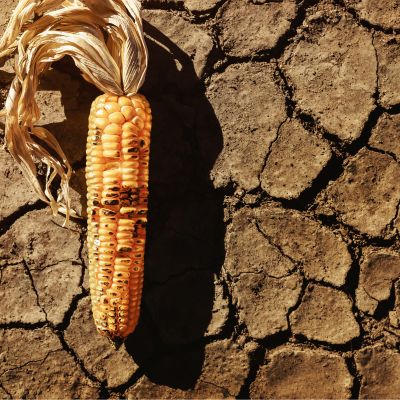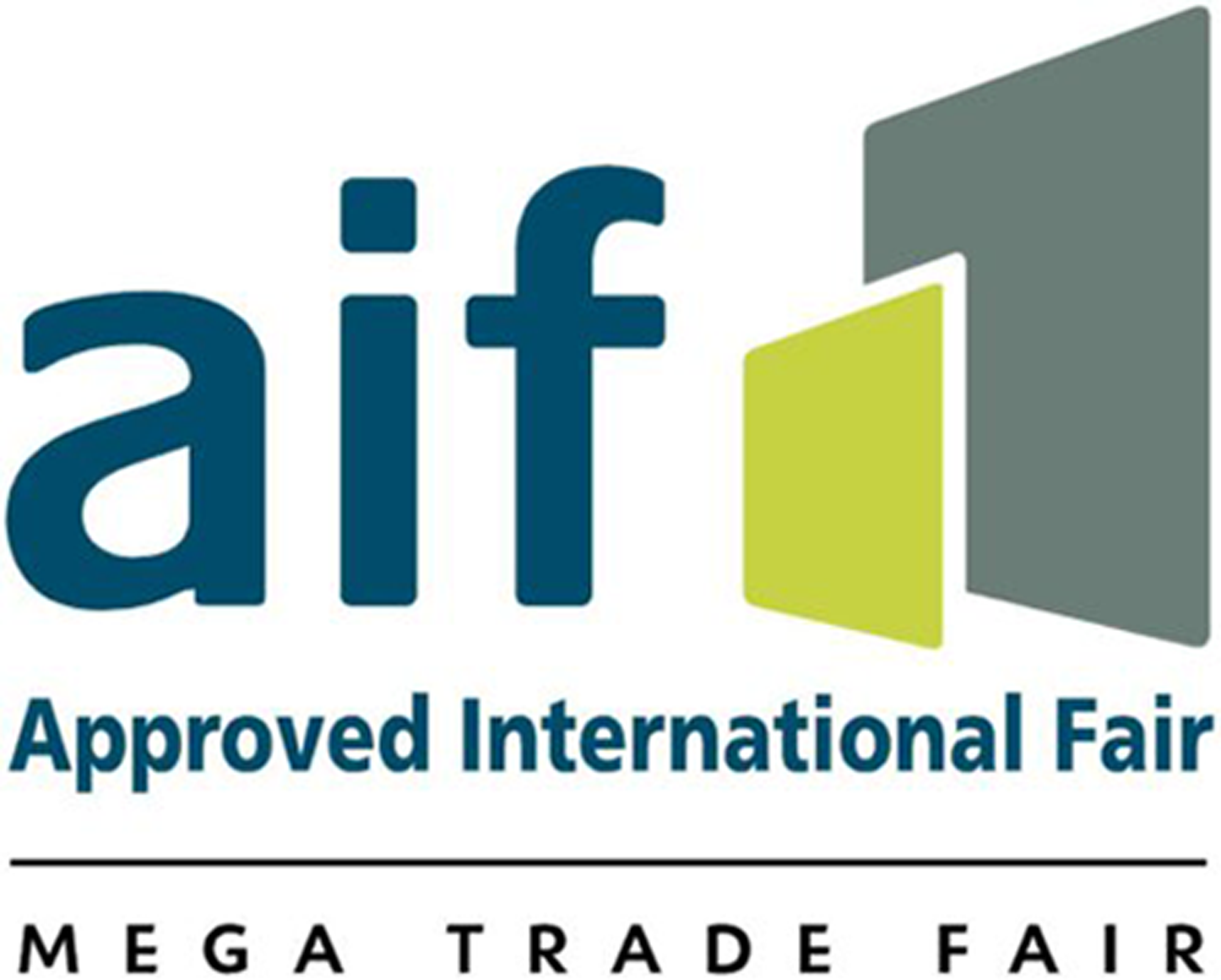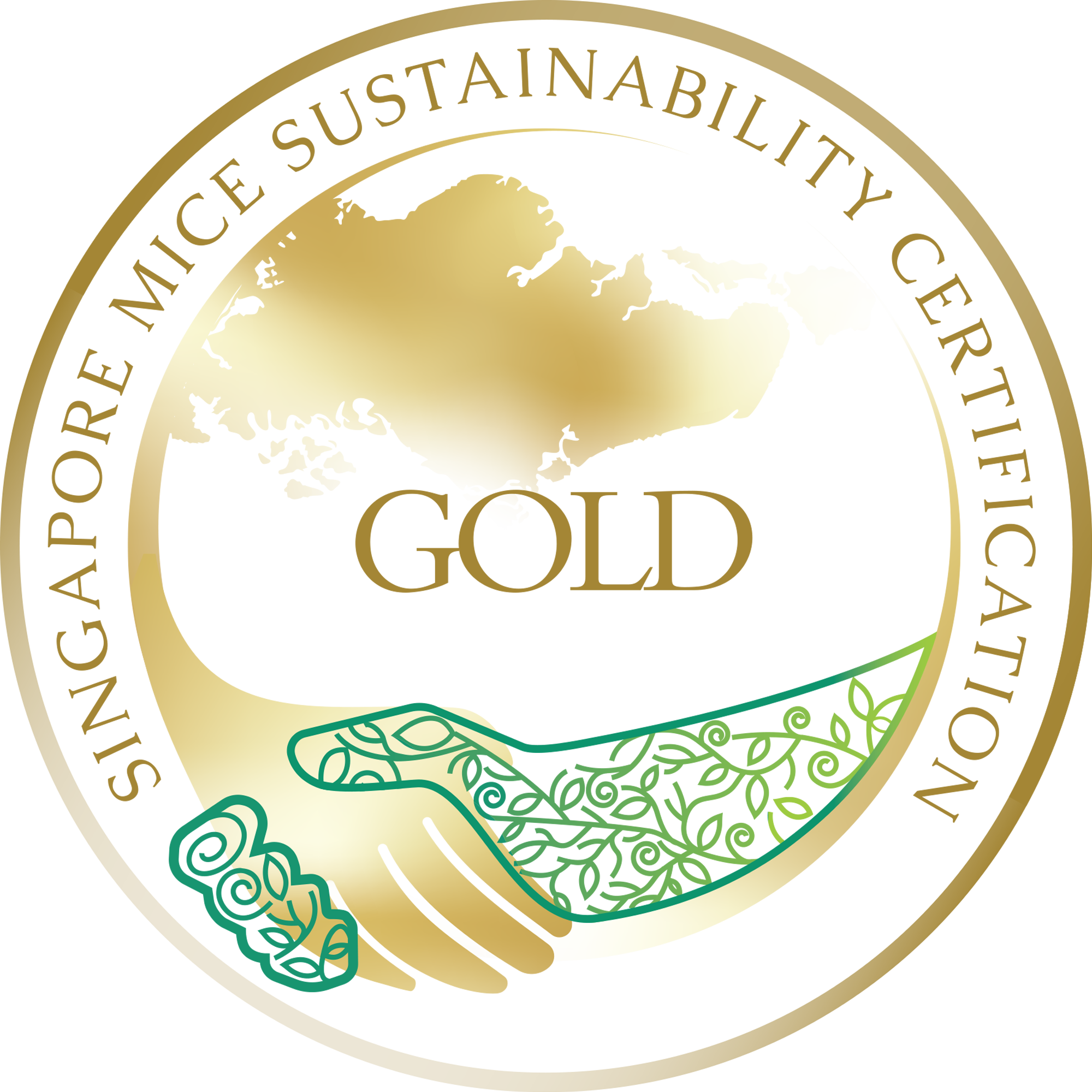Do you know what vegan wine is?
It’s fascinating to see how the buzz around vegan food and diets sparks interest in other areas, like vegan wine. Vegan wine is all about a process that clears out those tiny particles that naturally occur in newly made wine, giving it that crystal-clear look.
The latest trend of conscious eating is redefining the Food and Beverage sector. Consumers are searching for healthier options, and that’s pushing manufacturers to get creative and keep pace with this rising demand.
Did you know that over half of the American market and 36% of the British market, are now looking for vegan wine? That’s a pretty big deal!
So, if you’re in the hospitality sector, it’s definitely worth getting familiar with vegan wine and considering adding it to your menu. The demand is there, and now’s the time to meet it!
What Makes Wine Non-Vegan?
The debate about the origin of wine is an old one where its derivation from plants and animals is discussed on various platforms.
But the question remains the same – Is wine vegan?
Let’s understand what makes some wines non-vegan. In traditional wine-making, certain elements can surprise you.
As grapes transform into wine through fermentation, natural molecules like phenolics, tartrates, or tannins may cloud the appearance. While these are harmless, winemakers seek crystal-clear wines. This clarity often comes from using fining agents.
Many traditional fining agents are extracted from animal derivatives. Red wines might involve egg whites (albumin), and whites could use milk protein (casein). These agents help extract those harmless molecules, making the wine visually pleasing. But, alas, not vegan.
So, how is wine not vegan?
Animal-derived fining agents, such as gelatin, isinglass, and egg whites, make wine non-vegan.
Considering most of the wines are non-vegan, there is a huge demand for vegan options! This demand led to the manufacturing of vegan wine where clay-based methods are used to clear wine.
This method proves that wine can be both transparent and vegan-friendly.
When it comes to exploring what makes a wine vegan and a growing interest in wine market analysis, understanding these aspects helps you to choose wines based on your values, which is essential to every vegan wine enthusiast.
Vegan-Friendly Wine-making Process
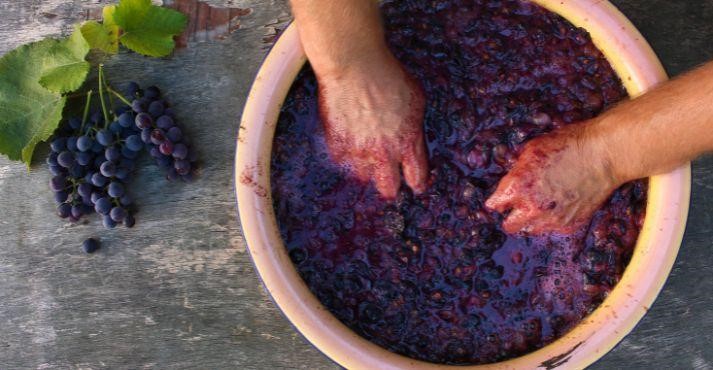
Some winemakers have chosen a path that avoids using materials like egg whites or milk protein for clarity. Instead, they’ve got some reliable alternatives. Meet bentonite, a natural clay that works like magic to clarify wine without animal ingredients.
Then, there’s activated charcoal, which soaks up any impurities, leaving the wine pure and animal-friendly.
Another option gaining traction is pea protein. It’s not just a plant-based protein; it’s also helping ensure your wine stays clear and stable. These options are great for vegans and contribute to a category known as natural wines.
Let’s break down how vegan wine is made:
- Grape Harvesting: Grapes are picked from farms that don’t use animal products in their farming. They’re picked carefully by hand or with machines.
- Crushing and Pressing: Grapes are squished to get their juice out. Then, the juice is separated from the solid parts.
- Fermentation: The juice is put into tanks or barrels, where yeast is added to start fermentation. This process turns sugar into alcohol.
- Clarification: Any remaining solids settle down naturally or are removed using vegan-friendly materials like clay or plant enzymes.
- Filtration: To get rid of any tiny bits, the wine is filtered using vegan-friendly materials like cellulose.
- Aging: The wine sits in barrels or tanks to develop its flavor.
- Bottling: Once it’s ready, the wine is put into bottles, sealed, and labeled.
- Quality Control: The wine is checked to make sure it tastes right and looks good. It’s also confirmed that no non-vegan stuff was used in making it.
In each step of the wine-making process, emphasis is placed on utilizing vegan-friendly practices and ingredients, thereby creating an authentically vegan-friendly product free from animal-derived additives commonly found in traditional wine-making techniques.
So, after this process, we question whether wine is vegetarian. Yes. In the world of vegan-friendly wine-making, we’re not just skipping animal additives but diving into the exciting area of the best natural wines.
These wines go the extra mile, avoiding additions and letting the grapes shine in their purest form.
Labels and Certifications
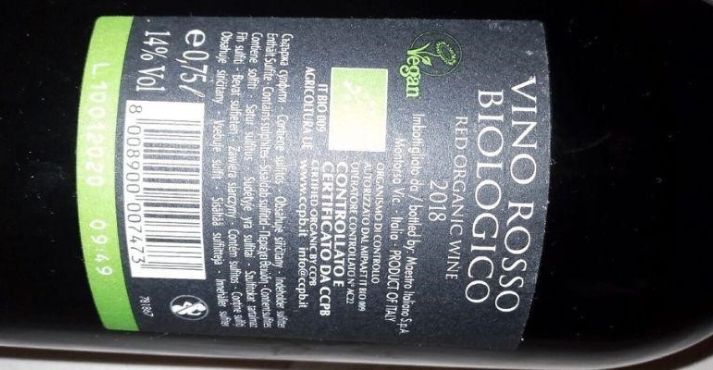
If, in the store, you look at a wine bottle and think, is this wine vegan-friendly? Look no further than the label.
Some wine bottles proudly shout it out – “Vegan Friendly.” This straightforward phrase lets you know that the wine you’re holding has been crafted without any animal ingredients. It’s like a bit of assurance right on the label.
But labels can speak different languages, so let’s talk about certifications. Some wines carry symbols or badges, like a little vegan stamp of approval. It could be from organizations like The Vegan Society, clearly indicating that your wine aligns with vegan values.
The significance lies in transparency. When a bottle is labeled “Vegan Friendly” or displays a vegan logo, it’s the same as the winemaker, affirming, “We adhere to cruelty-free practices.” It’s all about empowering you to make a choice that resonates with your values.
And it’s not just about vegan choices; some labels might use the term “Vegetarian Wine.” This means no meat-based fining agents were used, although other animal products like milk or eggs might still be present. So, reading labels becomes your superpower in navigating the variety of wines.
Understanding what a label says about your wine helps you choose a bottle that suits your taste buds and values.
Vegan Wine Brands and Regions

Let’s check out some tasty vegan wines. Have you ever thought about what makes a wine vegetarian or vegan? If you have, here are a couple of well-known brands to look into:
Vegan Wine Brands
- Vigilance: A brand by Shannon Ridge, offers vegan Chardonnay and Sauvignon Blanc along with red varietals like Cabernet Sauvignon and Pinot Noir, priced between $13 and $16 per bottle.
- Layer Cake: It offers vegan Sauvignon Blanc, Chardonnay, and a variety of reds and rosé, with their Primitivo boasting flavors of jammy black cherries, truffles, and espresso. Prices typically range from $10 to $20 per bottle.
Regions and Vineyards
- Napa Valley, California: A stunning place with vineyards that care about vegan values. Places like St. Supéry in Napa Valley offer top-notch vegan wine experiences.
- Marlborough, New Zealand: Known for Sauvignon Blanc, Marlborough has various spots with exceptional vegan choices.
Tasting Notes
- Vigilance Chardonnay 2020: It is fermented in neutral oak barrels, predominantly French and Hungarian. Its flavor profile combines the natural acidity of the cool, foggy Mendocino climate with the ripe flavors of Red.
- Layer Cake 2018 Pinot Noir: It is sourced from Monterey and Santa Barbara vineyards, fermented gently, and aged in French oak barrels. It has expressive raspberry, pomegranate, and cranberry notes, with hints of tea leaves and tobacco. The taste offers rich blackberries, ripe plum, soft tannins, and lingering dark chocolate.
Exploring vegan wine brands and regions is a tasty adventure whether you go for red or white. And when it comes to wine pairing, the options are endless. A hearty vegan pasta with a strong Cabernet Sauvignon may make your day!
Health Benefits of Drinking Vegan Wines
Have you ever wondered if your wine choice could be more than tasty? Let’s explore the health benefits of vegan wines, one of the healthiest alcohol-based beverages.
- Packed with Antioxidants: Vegan wines keep things simple, holding onto more antioxidants from the grapes. These antioxidants, like resveratrol, can be good for your heart.
- Allergen-Friendly: No milk or eggs here! Vegan wines are kind to allergies, making them an excellent pick for those with sensitivities.
- Happy Tummies: Without certain additives, vegan wines might be gentler on your stomach, keeping your digestive system in good spirits.
- Lower Sulfites: Vegan wines usually have fewer sulfites. For those sensitive to these compounds, it’s a win-win – less worry about stuff you might not want.
- Ethical Sipping: Choosing vegan wines is not just about taste; it’s a nod to an ethical lifestyle. It’s like sipping with a positive vibe, knowing it’s kind to animals.
- Healthy Lifestyle Choice: Sipping vegan wines isn’t just a drink but a lifestyle choice. Your glass might be contributing to a healthier you.
- Herbs for Extra Goodness: Some vegan winemakers toss in adaptogenic herbs known for reducing stress and boosting immunity – a little extra goodness in every sip.
So, is wine vegan? Absolutely! Choosing vegan wines will elevate your sipping experience and add a touch of health-conscious living to your glass.
Vegan Wine and Food Pairing

In the culinary world, combining vegan and plant-based dishes is a beautiful experience
1. Flavor Options
Vegan wines come in various flavors, from crisp whites to bold reds, appealing to various tastes.
2. Choosing Wisely
- Lighter Meals: For salads or citrusy pasta, add freshness to Sauvignon Blanc.
- Heartier Dishes: Pair robust reds like Merlot with vegetable stews or roasted dishes for rich flavors.
3. Bubbly Moments
Celebrate with Prosecco or Champagne, perfect for special occasions or alongside plant-based sushi.
4. Sweet Endings
Conclude your meal with a sweet vegan wine like late-harvest Riesling, complementing sugary notes.
5. Exploring Possibilities
Experiment with vegan wines in various cuisines – Thai, Italian, or Mexican – as they adapt well to different flavors.
When experiencing culinary enjoyment, the essence of vegan wine lies in its ability to enhance plant-based dining.
Environmental Impact of Vegan Wine-making
Here are the top 5 environmental impacts of vegan wine-making:
- Sustainable Sipping: Picking vegan wine often means supporting sustainable wine and practices. These wines use organic farming and fewer chemicals, putting the environment first.
- Vineyards with Care: Vegan winemakers take extra care of their vineyards, focusing on biodiversity and soil health. This not only makes better grapes but also helps the whole ecosystem.
- Planet-Friendly Packaging: Vegan wine-making goes beyond the bottle as it includes eco-friendly packaging. Many producers use materials that are good for the environment, reducing the overall impact.
- Less Waste: In vegan wine-making, less waste is the goal. The process aims to minimize leftovers, making the production cycle more efficient and eco-friendly.
- Thinking Big Picture: Choosing vegan wines means considering the bigger environmental picture. It’s a way of supporting a greener approach to wine-making and making good choices for the planet.
Then, what is vegan wine beyond its taste? It’s a thoughtful choice that pleases your taste buds and goes easy on the planet.
With sustainable practices, vineyards that care, and a commitment to reducing waste, vegan wine-making invites you to sip with a green mindset.
Conclusion
As we have explored what is vegan wine, just to recall, it is made without animal-derived ingredients or additives. It’s crafted using methods that avoid fining agents like gelatin or egg whites, commonly used in traditional winemaking.
Instead, vegan-friendly alternatives like bentonite clay or activated charcoal are used to clarify the wine. Choosing vegan wine means selecting a drink that aligns with ethical values and supports sustainable practices in vineyards.
It’s a simple way to enjoy your favorite drink while staying mindful of your health and the planet. So, whether you’re a wine enthusiast or just looking to make more ethical choices, opting for vegan wine is a win-win.

